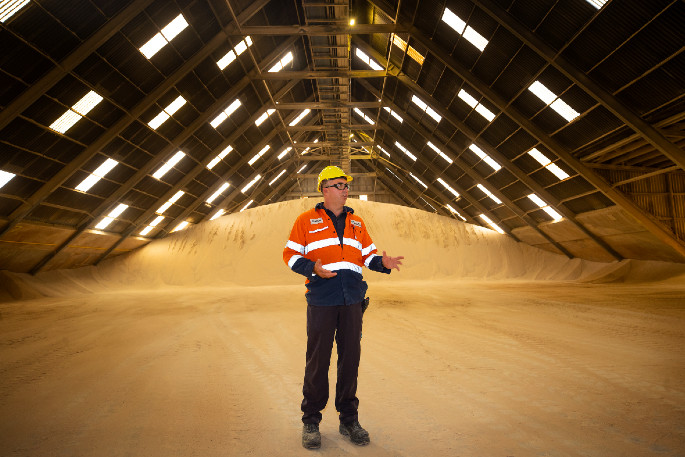The Polisario Front, Western Sahara's liberation movement, has failed in its High Court appeal for a judicial review into the New Zealand superannuation fund's investment into assets connected with so-called ‘blood phosphate'.
New Zealand fertiliser companies Ballance Agri-Nutrients and Ravensdown source phosphate rock from Western Sahara to make superphosphate fertiliser.
Ballance's head office is located in Mount Maunganui and a recent shipment of the material arrived at the Port of Tauranga.
It was met by condemnation from the Polisario Front and a protest by the Rail and Maritime Transport Union.
Western Sahara is a disputed territory in Northern Africa. Morocco governs the territory but the Polisario Front, representing the indigenous Saharawi people, seek independence and consider Moroccan rule an invasion of their territory.
A ceasefire in the region collapsed in November and the disputed sovereignty of the area has led to the popularisation of the term ‘blood phosphate'.
The phosphate rock from Western Sahara has a low cadmium rate, which makes it ideal for New Zealand soil and is considered crucial to the agricultural industry by the companies in question.
Kamal Fadel, the Polisario Front representative to Australia and New Zealand, and Mike Barton, of Western Sahara Campaign New Zealand, submitted the application against Guardians of New Zealand Superannuation, with the Fertiliser Association of New Zealand acting as an intervener. Ballance and Ravensdown's interests were represented by FANZ.
The Polisario Front's argument is that investment in the sourcing of phosphate rock directly contravened the Guardian's own mandate to ensure they manage and administer the fund in a way which avoids potentially prejudicing New Zealand's reputation as a responsible member of the world community.
The High Court concluded earlier this week, that whilst 'ultimately, a reputational risk to wider New Zealand interests remains”, there is no suggestion this risk is due to management or administration of the fund. The application was, therefore, dismissed.
The Polisario Front argues that the recognised potential reputational threat to New Zealand should be enough to push the likes of Ballance and Ravensdown away from the trade.
'Given that the High Court has recognised that the ongoing importation of Western Saharan phosphate to New Zealand poses a reputational risk to New Zealand's wider interests, we urge the New Zealand fertiliser companies and all those involved in the plunder of Western Saharan phosphate to cease the trade,” says Kamal.
'We continue to encourage the New Zealand Government, investors, fertiliser companies and farmers to recognise the ethical problems related to the extraction of resources from the occupied territory of Western Sahara, to adopt alternative sources without delay, and to stop any activities that support Morocco's unlawful occupation.”
However, the FANZ has thanked the High Court for their careful consideration of the case. They suggest this latest appeal was not based in legal argument and was a politically charged tactic which has proved costly to New Zealand taxpayers.
'From our perspective the applicant appears to have tried to use the Court for a political purpose, which has cost the New Zealand taxpayer hundreds of thousands of dollars,” reads an official statement from FANZ chief executive Vera Power.
'By dismissing the case, the Court has clearly recognised the case had no legal merit. In particular Justice Woolford notes that use of judicial proceedings in this way has been characterised as ‘lawfare.'”
The High Court felt the Guardians had developed policies to protect the fund from reputational damage based on widely accepted international standards.
'We feel assured that the careful work the industry has done to-date has been recognised by the Court. We will continue to engage carefully in our due diligence activities and are always looking for ways to improve.”



2 comments
World peace is impossible
Posted on 19-03-2021 12:06 | By Let's get real
Thanks to the Internet, social media and keyboard warriors, we have a world full of busybodies who seek notoriety through conspiracy theories and ideological dreams. The world was developed through conflict, military might and aggressive actions.... It's still happening and will very likely continue to happen. We now have another aggressive movement made up of aggrieved parties that are now able to gain support from other minority groups of aggrieved people and actively petition at a cost to others, rather than their own pockets. There used to be a saying "You can't change history" but some are heavily involved in trying, one ridiculous step at a time.
It's all very well...
Posted on 19-03-2021 13:17 | By morepork
...telling us not use the phosphate but we have no other source. The political turmoil in the area wasn't caused by us and we don't condone it. If they sorted themselves out and stopped fighting, they could probably share the wealth. I believe we SHOULD look for other sources, but meanwhile, we have no choice. NZ Taxpayers should never have had to pay for this legal case and it should have been stopped when it was realized what the true agenda was.
Leave a Comment
You must be logged in to make a comment.